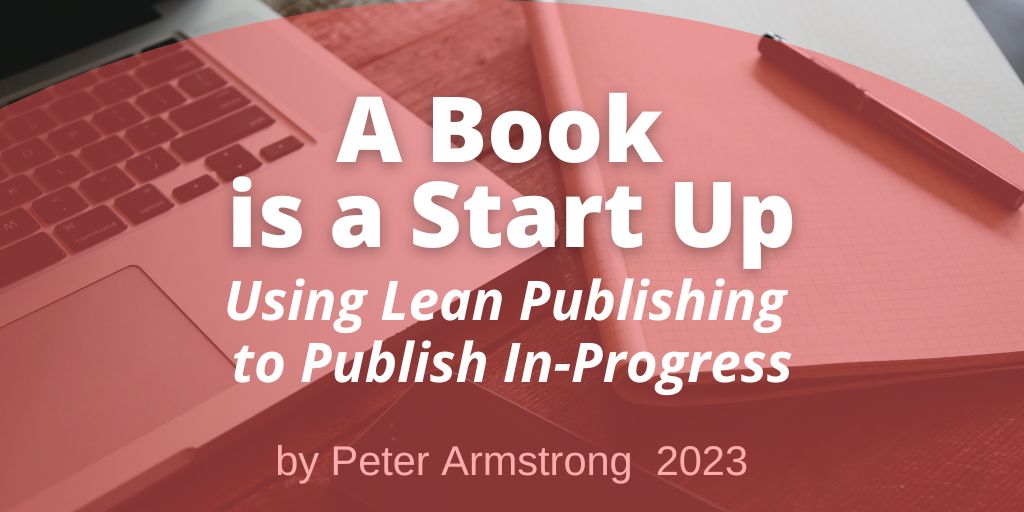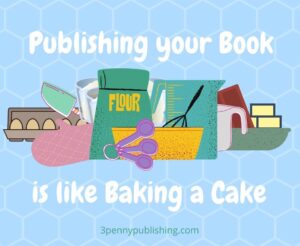
Hello fellow authors! I’m Peter Armstrong, founder of Leanpub––a startup based on a somewhat strange idea: that books should be published before the author has finished writing them. Our motto is: Publish Early, Publish Often.
Lean publishing is a method to publish your book as an ebook while it’s still being written. The specific definition is “publishing an in-progress book using lightweight tools and many iterations to get reader feedback, pivot until you have the right book and build traction once you do.”
You can do this either as a self-published author, or if you’re working with a forward-thinking traditional publisher. (Yes, you or your publisher can use Leanpub to do this, if you want to.)
How I Successfully Used ‘In-Progress’ Lean Publishing for my First Book
Lean publishing is partly based on my experience self-publishing my first book, Flexible Rails, while it was in-progress and how this method of publishing grew my readers early on and my sales.
I launched Flexible Rails very early in self-published form (on Lulu.com, since this was before Leanpub existed), and iterated new versions in public with feedback from a small but growing and dedicated community of readers. I remember getting about 30 sales in the first week (when the book was only about 150 pages) and thinking “well, I have to finish it now!”. It took me over a year to do so, and the book grew to hundreds more pages. When I finished the book in September 2007, the book had become #73 in all-time by revenue on Lulu! This all happened while it was self-published, in-progress, as a PDF.
Publishing in-progress helped me evolve my book into a finished, good quality book with traction––one that multiple publishers made offers for. Reader insights were invaluable, and their feedback helped to both improve the quality of the book, and give me motivation and determination to finish it.
This experience also led to me to launch the company Leanpub in 2010. I’m an author, so of course I wrote a short explanatory book called Lean Publishing (free to read here).
The Historical Origins of Lean Publishing
As I discuss in my book, lean publishing isn’t just for nonfiction, it can be for genre fiction too. In fact, the historical origins of lean publishing are found in the works of Charles Dickens, who first popularized serial fiction in Victorian England. Almost everything Dickens wrote was first published in serial form, and he iterated on all his work as he got feedback from his readers. Following Dickens, Wilkie Collins and then Mary Elizabeth Braddon pioneered the rise of “sensation fiction” (what today would be called genre fiction) in 1860s Victorian England. Sensation fiction was always published in-progress and Mary Elizabeth Braddon’s Lady Audley’s Secret was a massive success. (Sensation fiction was in some ways the Netflix of the 1860s.)
For more on the historical origins of Lean Publishing, you can find a video of my 2013 Tools of Change conference talk here.
Fast forwarding about 150 years, the idea of creating Leanpub was simple: it was everything I wished had existed when I was writing my first book Flexible Rails. Well, 12 years later and over $12,000,000 USD in royalties paid to authors, we’ve built exactly that. (Oh, and an online course platform too.) But we’re just getting started.
The origins of lean publishing also come from applying the lean startup ideas of Eric Ries and the customer development ideas of Steve Blank to the publishing process. The first book published on Leanpub was Eric Ries’ Startup Lessons Learned. Eric went on to write the New York Times bestseller The Lean Startup.
Leanpub is now excited to add AI-powered services to this story. Our authors can now choose to have AI translate their books into one of dozens of languages, or to even use AI to automatically create an online course from their book. We launched our AI services in April 2023, and I talk about why in this video.
The Benefits of Lean Publishing for Self-Published Authors
There are many benefits to publishing in-progress books: your early readers give you an authentic grassroots community around your book; you can use reader feedback to make your book better; and you can change your book’s direction (if it’s not resonating with early readers).
This approach works really well for the mostly non-fiction books published on Leanpub. However, fiction writers can also use lean publishing.
Lean Publishing tries to help authors with some pretty big questions:
* How to write the best book possible?
* Will anybody care about the book?
* How will people find out about the book?
* Will the book be released while it’s still relevant?
* How should the book be priced?
There’s no one answer for these questions. But getting reader feedback by publishing ‘in-progress’ can help you discover your answers, and sooner than you would have otherwise.
Most important to us at Leanpub, all these services for in-progress lean publishing are based on one thing: a simple book manuscript, written in plain text. This is possible because of our commitment to helping writers build books using lightweight tools, create many iterations to get reader feedback, and pivot until they have the right book to build traction.
Peter Armstrong is the founder and CEO of Leanpub. He has over two decades of experience in software, including eight years as a developer at Silicon Valley startups. He founded Ruboss in 2008, and launched Leanpub in 2010. Peter is the creator of Markua, the Markdown dialect used on Leanpub. He is the author of a number of books. He has a BSc in Computer Science and Psychology from the University of Victoria, and he and his wife live in Victoria, BC.
May 2023
 Writing and self-publishing a book is a big project with many tasks that need careful attention. Instead of getting overwhelmed by a huge checklist and schedule, think of self-publishing your book as if you are baking a cake. Your goal as an author is to have a cake that you are happy and proud to share with with others. Start by asking yourself these questions:
Writing and self-publishing a book is a big project with many tasks that need careful attention. Instead of getting overwhelmed by a huge checklist and schedule, think of self-publishing your book as if you are baking a cake. Your goal as an author is to have a cake that you are happy and proud to share with with others. Start by asking yourself these questions:
